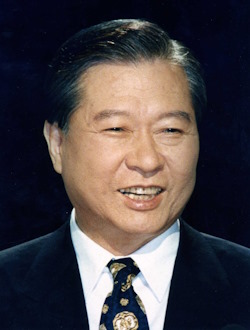 The Kim Dae-jung Award was established to honor the legacy of Kim Dae-jung, the 15th President of the Republic of Korea (South Korea) from 1998 to 2003 and Nobel Peace Prize laureate in 2000. A revered democratic philosopher-statesman, as well as the author of the 30-volume Kim Dae-jung Works, he is celebrated for translating his democratic philosophies and ideas into concrete policies that benefited both Korea and the world during his presidency. Sponsored by the Kim Dae-Jung Foundation, it is awarded at the IPSA World Congress of Political Science to honor a scholar of high international reputation in recognition of their academic contribution to global peace, democracy, and human rights. A roundtable celebrating the recipient of the Kim Dae-Jung Award on the themes of global peace, democracy and human rights will be organized at the IPSA World Congress.
The Kim Dae-jung Award was established to honor the legacy of Kim Dae-jung, the 15th President of the Republic of Korea (South Korea) from 1998 to 2003 and Nobel Peace Prize laureate in 2000. A revered democratic philosopher-statesman, as well as the author of the 30-volume Kim Dae-jung Works, he is celebrated for translating his democratic philosophies and ideas into concrete policies that benefited both Korea and the world during his presidency. Sponsored by the Kim Dae-Jung Foundation, it is awarded at the IPSA World Congress of Political Science to honor a scholar of high international reputation in recognition of their academic contribution to global peace, democracy, and human rights. A roundtable celebrating the recipient of the Kim Dae-Jung Award on the themes of global peace, democracy and human rights will be organized at the IPSA World Congress.
The award is granted based on the recommendation of the IPSA Committee on Organization, Procedures, and Awards (COPA). It will be awarded for the first time at the 2025 IPSA World Congress in Seoul.
Prize: $5,000 USD (1 recipient)
Condition:
The award recipient is to attend the upcoming IPSA World Congress and participate in the Kim Dae-Jung Award roundtable to receive the monetary prize. Remote participation will be possible only when the event is fully virtual for the Congress in question.
Nomination Procedures
Nominations may be submitted by academic institutions, including universities, departments, research centers, professional associations, and academies. Each nomination must be made through the head of the institution or department, and only one nomination per institution is allowed. Membership in IPSA is not a requirement for submitting nominations.
Nominations must indicate the contribution of the nominee in the fields of global peace, democracy and human rights and be accompanied by a formal nomination letter, the nominee’s biography and bibliography or list of their most significant scholarly contributions, and two letters of recommendation from prominent scholars (who do not need to be IPSA members) nominee.
Eligibility Criteria
- Demonstrated academic excellence with scholarly contributions that promote global peace, democracy, and human rights.
- Support of diversity, equity, and inclusion, in line with IPSA’s diversity policy.
Submitting Nominations
The nomination period for the Kim Dae-Jung Award is closed.
Nomination Deadline: 31 January 2025
Nominations must include the following:
- Letter of nomination indicating the contribution of the nominee in the fields of global peace, democracy and human rights of the nominee from the head of the organization or department;
- Biography and bibliography or listing of most important scholarly contributions of the nominee;
- Two letters of recommendation, signed by prominent scholars (who do not need to be IPSA members).
Please note: Self-nominations are not accepted.
Kim Dae-jung Award Recipients
2025 T.V. Paul, McGill University

T.V. Paul is Distinguished James McGill Professor at the Department of Political Science at McGill University, Montréal, Canada, and a Fellow of the Royal Society of Canada. He served as the President of the International Studies Association (ISA) from 2016 to 2017, and is the Founding Director of the Global Research Network on Peaceful Change (GRENPEC). Prof. Paul is the author or editor of 24 books, co-editor of five special journal issues, and author of over 90 scholarly articles/book chapters in the fields of International Relations, International Security, and South Asia.
His books include The Unfinished Quest: India’s Search for Major Power Status from Nehru to Modi (Oxford University Press, 2024); Restraining Great Powers: Soft Balancing from Empires to the Global Era (Yale University Press, 2018); The Warrior State: Pakistan in the Contemporary World (Oxford University Press, 2013); Globalization and the National Security State (with N. Ripsman, Oxford University Press, 2010); The Tradition of Non-use of Nuclear Weapons (Stanford University Press, 2009); India in the World Order: Searching for Major Power Status (with B.R. Nayar Cambridge University Press, 2002); Power versus Prudence: Why Nations Forgo Nuclear Weapons (McGill-Queen’s University Press, 2000); and Asymmetric Conflicts: War Initiation by Weaker Powers (Cambridge University Press, 1994).
Prof. Paul is the lead editor of the Oxford Handbook of Peaceful Change in International Relations (Oxford University Press, 2021) and currently serves as the editor of the Georgetown University Press book series: South Asia in World Affairs. He is the recipient of the 2024 International Studies Association (ISA)-Canada Distinguished Scholar Award and the 2025 International Security Studies Section Distinguished Scholar Award.











